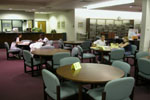Internet Archive Wayback Machine
About the Wayback Machine
Browse through over 240 billion web pages archived from 1996 to a few months ago. To start surfing the Wayback, type in the web address of a site or page where you would like to start, and press enter. Then select from the archived dates available. The resulting pages point to other archived pages at as close a date as possible. Keyword searching is not currently supported.
archive.bibalex.org, the Internet archive at the New Library of Alexandria, Egypt, mirrors the Wayback Machine. Try your search there when you have trouble connecting to the Wayback servers.
FAQs. "The Wayback Machine beta is built on an open source platform and now claims 150 billion pages in its database. Uninitiated readers should know that the Internet Archive "crawls" the Internet and saves copies of Web sites, much like search engine companies. The difference is that the Wayback Machine provides snapshots--"captures" in time of how Web sites looked at specific dates and times. Uses for the Wayback Machine include finding lost Web content and seeing how Web sites have changed over time. Users may view CNN.com, for instance, the day a major event occurred. After typing a URL, users have the option of clicking Show All, which goes right into the calendar of page captures, or clicking Latest to go to the most recent capture available. At the top of the search results screen is a new toolbar that displays a bar graph showing which years have the most captures. The toolbar also shows the total captures along with the oldest and most recent captures available. Some Web sites are "crawled" several times a day and some only a few times per month. Some search functionality (e.g., searching by URL, date, or keyword) from the classic Wayback Machine is not available in the beta version. Some known issues with the database are clearly indicated on the FAQ page. This reviewer experienced some slow page loads and site crashes. Nonetheless, this is still a neat tool. Summing Up: Recommended. Lower-level undergraduates and above; general audience. -- M. Shores, Miami University Hamilton". Reviewed in the July 2011 issue of ACRL's CHOICE
Browse through over 240 billion web pages archived from 1996 to a few months ago. To start surfing the Wayback, type in the web address of a site or page where you would like to start, and press enter. Then select from the archived dates available. The resulting pages point to other archived pages at as close a date as possible. Keyword searching is not currently supported.
archive.bibalex.org, the Internet archive at the New Library of Alexandria, Egypt, mirrors the Wayback Machine. Try your search there when you have trouble connecting to the Wayback servers.
FAQs. "The Wayback Machine beta is built on an open source platform and now claims 150 billion pages in its database. Uninitiated readers should know that the Internet Archive "crawls" the Internet and saves copies of Web sites, much like search engine companies. The difference is that the Wayback Machine provides snapshots--"captures" in time of how Web sites looked at specific dates and times. Uses for the Wayback Machine include finding lost Web content and seeing how Web sites have changed over time. Users may view CNN.com, for instance, the day a major event occurred. After typing a URL, users have the option of clicking Show All, which goes right into the calendar of page captures, or clicking Latest to go to the most recent capture available. At the top of the search results screen is a new toolbar that displays a bar graph showing which years have the most captures. The toolbar also shows the total captures along with the oldest and most recent captures available. Some Web sites are "crawled" several times a day and some only a few times per month. Some search functionality (e.g., searching by URL, date, or keyword) from the classic Wayback Machine is not available in the beta version. Some known issues with the database are clearly indicated on the FAQ page. This reviewer experienced some slow page loads and site crashes. Nonetheless, this is still a neat tool. Summing Up: Recommended. Lower-level undergraduates and above; general audience. -- M. Shores, Miami University Hamilton". Reviewed in the July 2011 issue of ACRL's CHOICE






0 Comments:
Post a Comment
<< Home